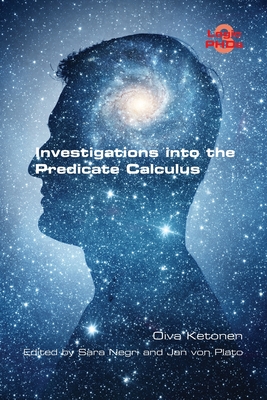Investigations into the Predicate Calculus

Investigations into the Predicate Calculus
Oiva Ketonen (1913--2000) was the closest to a student the creator of modern proof theory Gerhard Gentzen ever had. Their encounter took place in 1938--39 in Göttingen, with Ketonen hoping to receive a suitable topic for a doctoral dissertation and Gentzen instead deeply immersed in attempts at proving the consistency of analysis. Ketonen's thesis of 1944, his only work in logic, introduced what is today called the G3-sequent calculus. It is his best-known discovery, a sequent calculus for classical propositional logic the logical rules of which are all invertible. Few read his thesis, the results of which were instead made available through a long review by Paul Bernays. Ketonen's calculus is the basis of Evert Beth's tableau method and of the sequent calculi in Stephen Kleene's influential {\it Introduction to Metamathematics}. A second result was a sharpening of the midsequent theorem, by which the number of quantifier inferences with eigenvariables could be minimized. The existence of a weakest possible midsequent followed, in the sense that if any midsequent is derivable, a weakest one is. Turning this into a contrapositive, Ketonen found a purely syntactic method for proofs of underivability that he applied to affine plane geometry. His result, in modern terms, was a positive solution to the word problem for the universal fragment of plane affine geometry, with a syntactic proof of underivability of the parallel postulate from the rest of the affine axioms as a corollary.
140.53Lei
140.53Lei
Indisponibil
Descrierea produsului
Oiva Ketonen (1913--2000) was the closest to a student the creator of modern proof theory Gerhard Gentzen ever had. Their encounter took place in 1938--39 in Göttingen, with Ketonen hoping to receive a suitable topic for a doctoral dissertation and Gentzen instead deeply immersed in attempts at proving the consistency of analysis. Ketonen's thesis of 1944, his only work in logic, introduced what is today called the G3-sequent calculus. It is his best-known discovery, a sequent calculus for classical propositional logic the logical rules of which are all invertible. Few read his thesis, the results of which were instead made available through a long review by Paul Bernays. Ketonen's calculus is the basis of Evert Beth's tableau method and of the sequent calculi in Stephen Kleene's influential {\it Introduction to Metamathematics}. A second result was a sharpening of the midsequent theorem, by which the number of quantifier inferences with eigenvariables could be minimized. The existence of a weakest possible midsequent followed, in the sense that if any midsequent is derivable, a weakest one is. Turning this into a contrapositive, Ketonen found a purely syntactic method for proofs of underivability that he applied to affine plane geometry. His result, in modern terms, was a positive solution to the word problem for the universal fragment of plane affine geometry, with a syntactic proof of underivability of the parallel postulate from the rest of the affine axioms as a corollary.
Detaliile produsului










